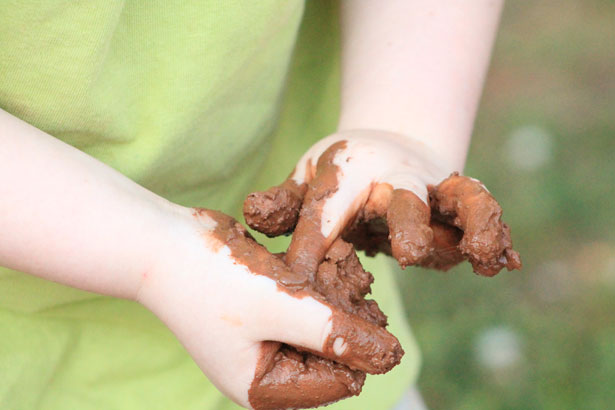More and more evidence proves that playing with mud pies is good for children. By introducing children to microbes in dirt, you could save their lives. Mud is good for the mind, too, filling it with precious childhood memories they’ll remember for a lifetime. There’s a reason why playing with mud pies is desirable to them – it’s fun and healthy!
We all know that a kid can be too clean, but should we force them into mud? Well, force – no, but we shouldn’t deny them a good romp in the mud. After all, mud is inexpensive organic food, isn’t it? We can also do things to encourage their getting dirty. While I’m no hipster, I do think we should get retro with our kids as far as mud is concerned. Let’s bring back mud pies, barbecue leaves, and flower salads. While I also believe in the potential of technology when it comes to fun and imagination development, nothing beats holding mud, feeling it texture, and using one’s imagination and crafting skills to turn it into something else. And who would ever deny the glee and happiness that comes from getting mud all over themselves and your favorite shirt? You’ll have a big smile on your face. It is the kind of smile that reaches into your heart.
Pediatrician Dr. Keya Lahiri recently spoke at a seminar playing with mud pies: “Parents should allow their kids to play outdoors, splash in the mud – because mud is a part of the environment and it is actually good for health.” She goes on to explain why it’s so great. “Due to over hygienic conditions, kids do not get much exposure to different bacteria; this weakens the immune system, which leads to asthma and other diseases. Whereas, early exposure to microbes present in the soil can help kids become stronger and disease-resistant.”
The sight of mud takes many of us back to our childhood. We made mud pies (sometimes for tasting!) and mud balls to throw at each other.
Nowadays, kids are usually glued to a TV, the computer, a mobile phone, or their handheld gaming console. Gone are the days when they beg to stay outdoors to play on the street. Nonetheless, we can take charge of the situation and throw their butts out in the backyard instead of avoiding those muddy messes that come with summer rains.
I have my own life evidence that proves playing with mud pies is healthy for kids. During my own childhood my younger cousin was always sick. My uncle, who’s a doctor, said that my cousin was just too clean. There’s an old bumpkin adage that says no one ever died from being too dirty. My cousin kept getting sick until my aunt finally started her playing in mud and dirt. I was more than willing to help commune my cousin with a ceremonial mud pie wafer. She was hooked from there on out. We would skew dried leaves on any stick that we can find and cook the leaves like barbecues. We would make mud pies and mud cakes and decorate them with pebbles, flowers, soda bottle caps, and pretty much anything that we could find in the yard. We spend some of the most happy summer afternoons of our lives. More importantly, my cousin stopped getting sick. Coincidence? Perhaps, but I don’t think so.

Now that I am a mother, I encourage playing with mud pies every once in a while. We rarely have mud in the yard so I let him play with the next best thing – sand at the beach. I watch him and his cousin build castles and forts and take their pictures, wishing to preserve these precious moments forever while knowing the mud is good for their bodies, inside and out.

New research continues to support the wisdom in my uncle’s prescription – that mud and dirt builds a child’s immune system.
By giving our children the freedom to play, eat and develop creatively with those tools at their fingertips, they also create precious memories that will make him smile when he sees his own children – my grandchildren – go for the mud.


